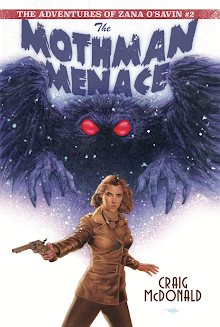 |
| ORSON WELLES in LADY FROM SHANGHAI |
The first five novels in the Hector Lassiter series—One True Sentence, Forever's Just Pretend and Toros & Torsos—are newly available from Betimes Books. (Ordering information below)
In the first Hector Lassiter novel, Head Games, Hector visited his old friend Orson Welles on the set of Welles’ noir classic Touch of Evil.
It
was noted in Head Games (set in 1957) that Hector owed Orson a favor
connected to something that happened between them ten years earlier.
Toros & Torsos reveals
what went down between the two a decade before — specifically, in January 1947
on and around the set of Welles’ other noir epic, The Lady From Shanghai, co-starring Welles’ soon-to-be ex-wife, Rita
Hayworth.
 |
| RITA HAYWORTH from infamous mirror room shootout |
As noir czar Eddie Muller describes in his excellent Dark City: The Lost World of Film Noir, Welles based his film on If I Die Before I Wake, a small-scale potboiler by Sherwood King, turning it
into an immensely complex, globe-trotting affair.”
A key confrontation in Welles’ heady film takes place in a twisted fun
house designed by Welles that incorporates severed limbs and mutilated faces —
imagery echoing, or perhaps anticipating, the mutilations performed on
Elizabeth Short, the so-called “Black Dahlia” in Los Angeles in January 1947.
Welles, an avid magician, used to perform an elaborate magic act
(which included sawing a woman in half) on virtually the same spot where Betty
Short’s severed torso was found.
That macabre fact, coupled with reports Betty
Short was “involved” with a man named George (Welles’ given name), that eerie
funhouse movie set, and some mysterious filming delays around the time of the
Black Dahlia murder led one True Crime author to put Welles forward as a Black
Dahlia murder suspect in a recent book…a scenario explored in the Hollywood
portion of Toros & Torsos.
By anyone’s standards, Welles’ film’s production was a tortured one.
Apart from the friction between Orson and Rita, cast members were frequently
ill as production shifted between Mexico and the U.S. and back again.
Welles’
decision to cut and color Rita’s trademark hair, as well as his labyrinthine
plot, confused and alienated Columbia mogul Harry Cohn, who ultimately took the
film away from Welles.
As Muller notes, associate producer William Castle presciently
wrote in his diary, “Cloudy and heat oppressive. First day of shooting on Lady
From Shanghai. The darks clouds seemed like an omen…”
TOROS & TORSOS










































When I 1st saw "The Lady from Shanghai" it's haunting effect was different than other Noirs. I could never quite explain it, but it was like an undertone of macabre realism. This connection w/ 'The Black Dahlia,'seems so overwhelmingly unimaginable
ReplyDeleteOrson Welles was so many things,but to wrap my head around the theory of Welles as murderer is a bit hard to swallow.
"THE LADY FROM SHANGHAI," has always had a raunchy realism, a macabre sense of eerie truth in the face of reality. Only yesterday, did I learn of this connection to'The Black Dahlia.' Far fetched is an understatement. In Life as in Art,nothing is impossible.I wouldn't be surprised if the missing footage from the fun house sequence wasn't stored away in some obscure location that only Welles would know. It is it's own movie within a movie. Not to take a line from, "The Maltese Falcon," ..."the stuff that dreams are made of;" No, this is the stuff that Nightmares are made of. The stuff that great Film Noir is all about.
ReplyDelete